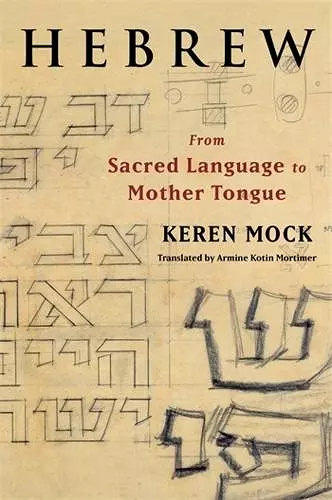Hebrew
From Sacred Language to Mother Tongue
Keren Mock author Armine Kotin Mortimer translator
Format:Paperback
Publisher:Columbia University Press
Publishing:23rd Dec '25
£25.00
This title is due to be published on 23rd December, and will be despatched as soon as possible.

For nearly two thousand years, Hebrew belonged to the realm of the sacred. A written liturgical language used primarily by rabbis and scholars, it was not spoken in everyday contexts. A revival process in the late nineteenth century brought Hebrew back into daily use, adapting sacred texts as the foundations for a new vernacular. A “mother tongue” emerged.
Keren Mock provides a strikingly original multidisciplinary account of this transformation of Hebrew from an ancient sacred tongue to a secular spoken language. Bringing together psychoanalytic, semiotic, and comparative-literature perspectives, she provides deep insight into key moments in this history. Drawing on extensive, revealing interviews, Mock offers critical readings of two major Israeli authors, Aharon Appelfeld and Sami Michael, focusing on their struggles to write in Hebrew as immigrants. She delves into the archives of the lexicographer Eliezer Ben-Yehuda, the creator of an all-embracing dictionary of ancient and modern Hebrew, and considers Baruch Spinoza’s little-known Hebrew grammar in light of his philosophical works. In reflecting on the making and meaning of a mother tongue, Mock addresses questions of memory and forgetting, mourning and restitution, and the sacred and the secular. Through the exceptional history of Hebrew, this book uncovers the workings of language in the social and psychological realms.
Hebrew features forewords by Pierre-Marc de Biasi, an artist and scholar of literature, and Julia Kristeva, a renowned psychoanalyst, philosopher, and linguist, speaking to the significance of the book.
Keren Mock's book offers a new and illuminating perspective on the modern revival of Hebrew. Working in reverse chronological order, she begins with two contemporary Hebrew writers who came from the background of another language, then proceeds to the foundational enterprise in renewing the language of Eliezer Ben-Yehuda at the beginning of the twentieth century, and concludes with Spinoza, who extracted Hebrew from its status as a holy tongue. This is a work of exemplary scholarship. -- Robert B. Alter, translator of The Hebrew Bible
In this fascinating and innovative book, Mock examines the revival of the Hebrew language and the roots of its secularization. Bringing together philosophy, psychoanalysis, linguistics, and literary studies, she provides a thought-provoking reflection on how a language becomes a mother tongue. -- Clémence Boulouque, author of On the Edge of the Abyss: The Jewish Unconscious before Freud
ISBN: 9780231217125
Dimensions: unknown
Weight: unknown
360 pages